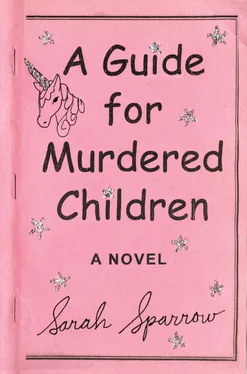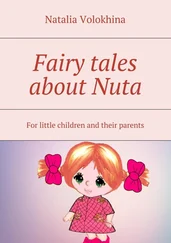Sarah Sparrow - A Guide for Murdered Children
Здесь есть возможность читать онлайн «Sarah Sparrow - A Guide for Murdered Children» весь текст электронной книги совершенно бесплатно (целиком полную версию без сокращений). В некоторых случаях можно слушать аудио, скачать через торрент в формате fb2 и присутствует краткое содержание. Город: New York, Год выпуска: 2018, ISBN: 2018, Издательство: Blue Rider Press, Жанр: Фэнтези, Триллер, Детектив, на английском языке. Описание произведения, (предисловие) а так же отзывы посетителей доступны на портале библиотеки ЛибКат.
- Название:A Guide for Murdered Children
- Автор:
- Издательство:Blue Rider Press
- Жанр:
- Год:2018
- Город:New York
- ISBN:978-0-399-57452-8
- Рейтинг книги:5 / 5. Голосов: 1
-
Избранное:Добавить в избранное
- Отзывы:
-
Ваша оценка:
- 100
- 1
- 2
- 3
- 4
- 5
A Guide for Murdered Children: краткое содержание, описание и аннотация
Предлагаем к чтению аннотацию, описание, краткое содержание или предисловие (зависит от того, что написал сам автор книги «A Guide for Murdered Children»). Если вы не нашли необходимую информацию о книге — напишите в комментариях, мы постараемся отыскать её.
A Guide for Murdered Children — читать онлайн бесплатно полную книгу (весь текст) целиком
Ниже представлен текст книги, разбитый по страницам. Система сохранения места последней прочитанной страницы, позволяет с удобством читать онлайн бесплатно книгу «A Guide for Murdered Children», без необходимости каждый раз заново искать на чём Вы остановились. Поставьте закладку, и сможете в любой момент перейти на страницу, на которой закончили чтение.
Интервал:
Закладка:
“As best I can.”
“Good. Now, in regards to schizophrenia, in which this house purportedly traffics,” he sniggered. “Well, there is mystery regarding its origins. I don’t mean genetics because everything is genetics. What I really mean is…” He literally scratched his chin and meditated. “I may have erred in my little premise. What I meant to say is that all is mystery, everything , even the most commonplace, the most familiar, the most mundane. All is an absolute, inscrutable mystery! Even the working lives of those incompetent people at Swarthmore, even that: a complete and total mystery.”
He paused, as if it were an opportune time to reprise the question— Are you following me, Annie? —but demurred.
“I’d go as far as to say it’s a miracle that any of us are able to function… not bodily functions, which seem to carry on perfectly well with or without our cooperation, but the functioning of our minds. It’s a miracle the whole lot of us don’t wind up in Swarthmore, completely insane—yet we don’t. Another mystery! We do our grocery shopping and laundry, we go to the bank and obey traffic signals. (Some of us!) We fall in love, get married, have children and so forth.” He threw her an impish look. “You’ve been dreaming of a train, haven’t you, Annie?”
She thought about it—it wasn’t a conscious thing until he asked—and startled herself by saying, “I have.”
“Now we have two mysteries! The first is the recurring dream of the train, a mystery wrapped in the mystery of a dream. The second mystery is my knowing it. In your dream, someone—some thing —wrestles you into a cabin, no?”
“Yes!”
“And you wait, you wait very patiently, frightened and bewildered, until a man comes in. A tall, gaunt gentleman much like myself, no? He offers you a tray of refreshments. He seems to know what you’d enjoy: ginger cookies and herbal tea. Your favorites, no? You have this dream for weeks until one night the man tells you to look at the other side of the coaster where you set your tea. You turn it over and find an address written there. He asks you to memorize it. That was the very way I came to be Porter,” said Jasper. “In the same fashion you’ve begun your journey. Except in my case , I came to Portership much later in life than you—sometimes that happens. It’s not ideal but it can’t be helped. My tray,” he said, with a parenthetical gleam in his eye, “came with my favorites: bar nuts and a Tom Collins! That’s how it happened. And it’s been happening forever, the baton passed from Porter to Porter. The longer I’ve been doing this, the more certain I am that what I said earlier is correct: the only thing we can be sure of is that it’s all one great mystery—no one knows anything nor ever will. And that is the least mysterious thing we shall ever be able to comprehend.”
Annie skipped to the pages that she wrote just before he died.
Jasper was in hospice care, ending his days on Earth. He was in an upstairs room of the halfway house, tended by Porters in various stages of tutelage who hadn’t yet left for cities unknown. (Among the ladies were a few men, though Jasper said male Porters were far more rare.) He told Annie that a half year before—around the time he scooped her up from Swarthmore—he became aware that he too was departing, “though on a more pedestrian path than our children do after their moments of balance . I’ll be leaving in a most conventional way, and so be it. There’s nothing to be done.” He said that she would know when her own time had come—when she was dying—“by signs and wonders. Things will begin to go… haywire.”
“What do you mean, ‘haywire,’ sir?”
“When a Porter passes the baton, there’s a period of ‘haywire.’ Inexplicable things will occur—within that which is already inexplicable, of course. Only someone new will be able to set things right again. It’s always been like that. We don’t know why; we don’t ask because we know nothing.”
She set down the pages and thought of the rambunctious girl—and of Dabba Doo, the gentle, eccentric, barefooted man who wore the same tweed suits favored by her mentor, and had stayed too long. She thought of Maya and Troy, the brother and sister, and how murdered siblings had never arrived in toto before—and the agitated older man whom she’d recently wrestled to his cabin with the help of the shadowy Subalterns. A fully grown man, on the children’s train! She unaccountably had brought him a Tom Collins— Jasper’s drink—but the offering infuriated him and he knocked it off the tray, much like the odd-looking teenage girl had with her lemonade.
He was the only one aboard who wasn’t awash in blue…
She thought of all those things and knew what she had always known, but long forgotten:
The time that Jasper foretold had begun.
HAYWIRE
1.
When Lydia and Daniel got there, Annie hadn’t yet arrived.
The landlords mingled sheepishly, helping themselves to coffee, lemonade and cookies, or just sat in their seats staring straight ahead. The group had never been together without the Porter, who was always there to greet them. Some thought Annie’s tardiness had something to do with the Meeting having been changed to midday from its usual evening spot.
Lydia spontaneously approached Dabba Doo.
“How are you?” she said, shy and brave at once.
Interaction among guests was rare and he was pleasantly surprised. His eyes were pale green and she was drawn to them. He looked to be about sixty, the oldest landlord in the room.
“I’m very well, thank you,” he said.
“I guess Teach got stuck in traffic, huh?”
“She does take the bus, which makes her subject to the rather dependable delays of the Metro.”
“I wonder why she doesn’t have a car.”
“It would be more convenient, I suppose.”
“Where does she live?”
“A closely guarded secret,” he said affably. “Perhaps an automobile isn’t within her budget—though she never struck me as the driving type.”
“Well, I’m glad she takes a bus and not a bicycle.”
“Dangerous, those! This mad push for cyclists’ rights has certainly emboldened them. They tend to make the mistake of believing they’re indestructible. It breeds entitlement.”
“Why are you called Dabba Doo?” she asked, emboldened herself. It felt nice to make a new friend.
“I was a fanboy—to put it mildly!—of The Flintstones . Loved running around the house all day screaming Yabba Dabba Doo! I didn’t have all my teeth and ‘dabba doo’ was all that came out. Everyone thought that incredibly amusing. It stuck.”
“How old were you when you were…”
Murdered, she meant, without supplying the word.
It felt like a line had been crossed but she couldn’t help blurting it out; something about him gave her permission. He seemed so familiar, ready-made, so much like family. Maya (she felt less like Lydia just then) felt a closeness toward him that was different from her feelings toward the other fellow travelers, an intimacy almost like the blood-closeness Lydia felt for Daniel. Dabba Doo grew thoughtful and when it looked like he was about to answer, Annie strode in and the Meeting began.
Right away, Lydia noticed something “off”—the Porter looked pale and sweaty, half from hurry, half from something else.
There weren’t any new guests (Daniel had been the latest), and Lydia surveyed the faces in the room during Q&A time: Daniel, of course, and Dabba Doo… the attractive Nordic-looking woman named Violet who worked in IT… José, a jovial, portly fellow who didn’t at all look like a “José.” (He was some sort of engineer and was fond of wearing heavy Pendleton shirts, even though he had a perspiration problem.) Rounding out the tribe was an African-American yoga teacher in his thirties called, of all things, Rhonda. The absurdity of such a creature having that name made Lydia giggle.
Читать дальшеИнтервал:
Закладка:
Похожие книги на «A Guide for Murdered Children»
Представляем Вашему вниманию похожие книги на «A Guide for Murdered Children» списком для выбора. Мы отобрали схожую по названию и смыслу литературу в надежде предоставить читателям больше вариантов отыскать новые, интересные, ещё непрочитанные произведения.
Обсуждение, отзывы о книге «A Guide for Murdered Children» и просто собственные мнения читателей. Оставьте ваши комментарии, напишите, что Вы думаете о произведении, его смысле или главных героях. Укажите что конкретно понравилось, а что нет, и почему Вы так считаете.












